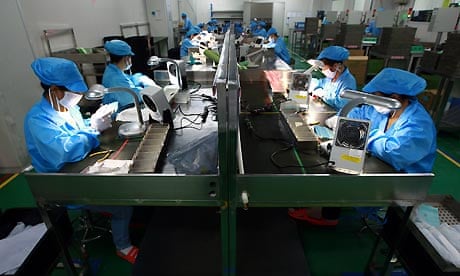China will overtake the US in the next four years to become the largest economy in the world, says a leading international thinktank.
The Paris-based Organisation for Economic Co-operation and Development (OECD) said China's economy will be larger than the combined economies of the eurozone countries by the end of this year, and will overtake the US by the end of 2016.
Global GDP will grow by 3% a year over the next 50 years, it says, but there will be large variations between countries and regions. By 2025, it says the combined GDP of China and India will be bigger than that of France, Germany, Italy, Japan, UK, US and Canada put together. Asa Johansson, senior economist at the OECD, said: "It is quite a shift in the balance of economic power we are going to see in the future."
Inequalities will persist, even though people in the poorest countries will see their income more than quadruple by 2060, with those in China and India seeing a more than a seven-fold increase. By 2060, the OECD says living standards in the emerging countries will still only be 25%-60% of the level enjoyed by those in the US.
Global imbalances, which created the conditions for the crash of 2007, will continue to widen and reach pre-crisis levels by 2030, it said. In the short term, this is largely a cyclical effect of the financial crisis. So the US, which had a large budget deficit before the crisis, experienced a sharper downturn than China, which had a budget surplus.
The OECD warned that rising imbalances could undermine growth. But, it said, if countries undertook more ambitious reforms with regards to labour and production, they could be reduced. Johansson said these could address how easy it was to hire and fire employees, or regulations around starting up a business and restrictions over foreign business investment.
